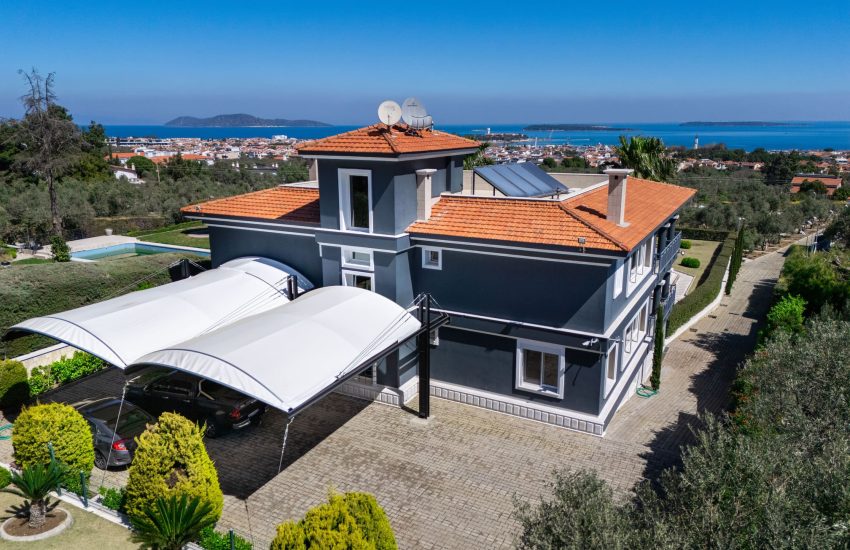How Can Foreigners Buy and Sell Real Estate in Turkey?

The best real estate company in Turkey for foreigners is one that combines expertise in the local market with an understanding of international clients’ unique needs. This company offers comprehensive services, including legal and financial guidance, assistance with residency or citizenship applications, and multilingual support in languages like English, Arabic, Russian, and German. Known for transparency and professionalism, they provide a wide portfolio of properties across Turkey’s most popular areas, from the cosmopolitan vibe of Istanbul to the serene coastlines of Antalya and Bodrum. With a strong reputation, positive client testimonials, and outstanding after-sales support, this company ensures that foreign buyers experience a smooth, secure, and rewarding journey to owning property in Turkey.
Turkey has emerged as a popular destination for foreigners seeking to invest in real estate. With its vibrant cities, scenic coastlines, and relatively affordable property prices, Turkey provides attractive opportunities for individuals looking for a second home, an investment property, or even a pathway to citizenship. In recent years, Turkey has simplified the property purchase process for foreigners, making it accessible and straightforward. Here’s a comprehensive guide that covers each stage of buying and selling real estate in Turkey.
In 2012, Turkey lifted restrictions for foreign nationals from over 180 countries to buy real estate, encouraging international investment. Some key considerations include:
- Eligibility: Citizens of many countries can purchase property without restriction, but certain nationalities (such as Syrians and Armenians) face limitations. Always verify eligibility based on your nationality.
- Restricted Zones: Foreigners are prohibited from buying property in certain military zones and strategic areas. A local real estate advisor can help verify that a desired property is not in a restricted area.
- Professional Advice: Working with a licensed real estate agent or legal advisor is essential to ensure compliance with these regulations and a smooth transaction.

Here’s a breakdown of the entire purchasing process:
Step 1: Conduct Property Research
- Identify the Right Location: Popular areas for foreigners include Istanbul, Antalya, Bodrum, and Fethiye. Each area offers different lifestyle experiences, such as metropolitan living, coastal luxury, or cultural immersion.
- Visit Properties: Seeing properties in person gives you a feel for the area, neighborhood, and property specifics.
- Engage a Real Estate Agent: A licensed agent familiar with Turkish property laws can provide valuable insights, help identify ideal properties, and guide you through local market trends.
Foreign buyers need a tax identification number (Vergi Kimlik Numarası) for legal and financial transactions in Turkey. To get a tax ID:
- Visit a Local Tax Office: Bring your passport as proof of identity.
- Complete Necessary Forms: The process is generally quick and straightforward, often completed on the same day.

Opening a Turkish bank account is typically necessary for transferring funds, paying taxes, and settling other expenses related to property purchases. Required documents include:
- Your Passport
- Turkish Tax ID Number
- Proof of Address: This could be a recent utility bill from your home country.
Once you’ve chosen a property:
- Draft a Sales Contract: The contract should outline terms such as purchase price, payment schedule, handover date, and any additional conditions. Ensure it is translated into your native language.
- Down Payment: It’s customary to pay a deposit, typically 10-20% of the property price, to secure the agreement.

A property valuation report is required by law to assess the property’s fair market value. This process protects both the buyer and the government from potential fraud. Here’s how it works:
- Independent Appraisal: A certified valuation expert inspects the property and issues a report.
- Report Submission: The report is submitted to the Tapu (Land Registry Office) as part of the documentation.
The title deed (known as Tapu in Turkish) is the final step in completing the purchase. It formally transfers ownership to the buyer and is conducted at the local Tapu office. Both the buyer and seller (or their legal representatives) need to be present, and a sworn translator is required if the buyer does not speak Turkish.
- Pay Title Deed Fees: Generally, the title deed transfer fee is 4% of the assessed property value, split between buyer and seller, although in some cases, this cost may be negotiated.
- Registration: After all fees and taxes are paid, the property is registered in your name, and you receive the Tapu, officially making you the owner.

Foreign buyers in Turkey can access a variety of financing options:
- Turkish Mortgages: Many Turkish banks offer mortgage options to foreigners. Typically, banks require a 30-50% down payment.
- Documentation for Mortgage: Documents often include proof of income, a Turkish tax ID, and a valid passport.
Investing in Turkish real estate comes with residency and citizenship advantages:
- Residency Permit: Buying property worth a minimum of $50,000 (or $75,000 in some metropolitan areas) makes you eligible for a one-year renewable residence permit.
- Citizenship Program: Foreigners investing $400,000 or more in Turkish property can apply for Turkish citizenship, provided the property is not sold for three years.
This citizenship pathway has attracted international investors, as it provides freedom to live and work in Turkey and travel more easily within the region.

Selling real estate in Turkey involves a series of steps, similar to those for a Turkish national. Here’s what to expect:
Hire a Real Estate Agent: Working with a reputable agent helps you reach local and international buyers and determine a competitive price.
Set the Right Price: Your property valuation report can be a guide, as it gives an objective assessment of your property’s worth in the current market.
Capital Gains Tax Liability: If you sell within five years of purchase, you may be liable for capital gains tax on any increase in property value. The tax rate is determined by the profit earned, so ensure to calculate this when setting a sale price.
Tax Exemption: Properties held for five years or more are exempt from capital gains tax.
Sales Agreement: Both parties sign a sales agreement, with the buyer typically paying a deposit.
Title Deed Transfer: Similar to the buying process, both parties need to be present at the Tapu office, or they may designate legal representatives.

Some of the costs foreign buyers and sellers may encounter include:
Title Deed Transfer Fee: 4% of the property’s appraised value, typically split between buyer and seller.
VAT on Property Sales: Generally, new properties have an 18% VAT, while most resale properties are VAT-exempt for foreigners.
Notary and Translator Fees: For legal documentation and translation services.
Real Estate Agent Commission: Typically 3% for each side (buyer and seller).
Here are a few additional tips to make the buying and selling process in Turkey as smooth as possible:
Legal Representation: Having a lawyer is beneficial to help review contracts, verify property records, and ensure compliance with Turkish law.
Currency Exchange: Real estate transactions in Turkey are generally conducted in Turkish Lira. Be aware of exchange rates and consult a currency expert if needed.
Due Diligence: Confirm the property has no outstanding debts, mortgages, or encumbrances by checking with the Tapu office.
Istanbul Property
Turkey’s real estate market has proven to be an attractive choice for foreign investors looking to diversify their portfolios, secure a residency permit, or even obtain citizenship. By following the proper steps, consulting with professionals, and conducting thorough research, foreign buyers and sellers can navigate the process with confidence. With the right planning, purchasing property in Turkey can be a rewarding investment in one of the world’s most unique and beautiful regions.






